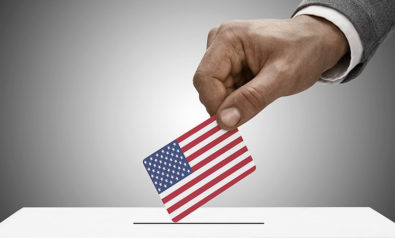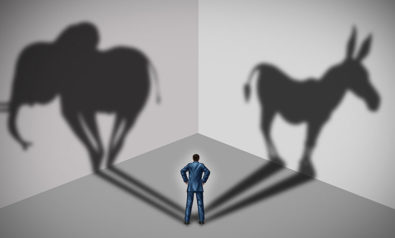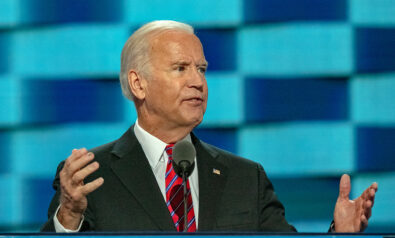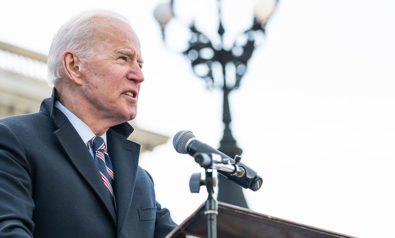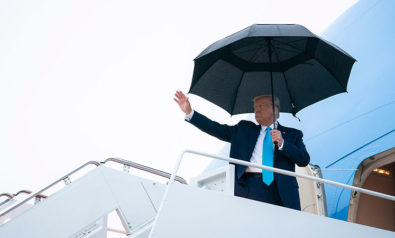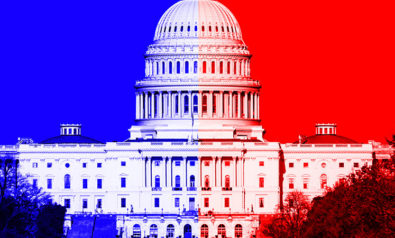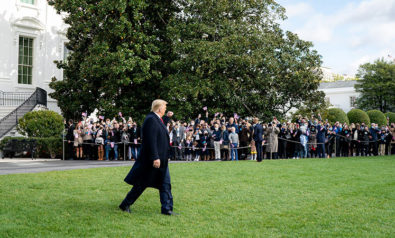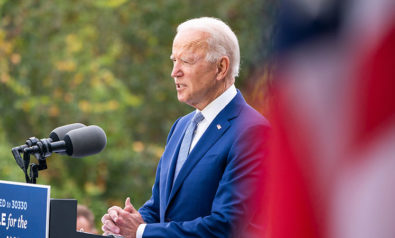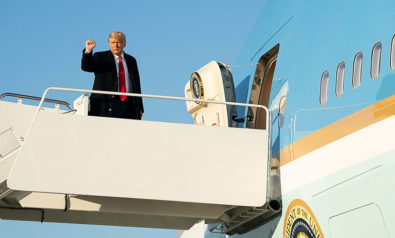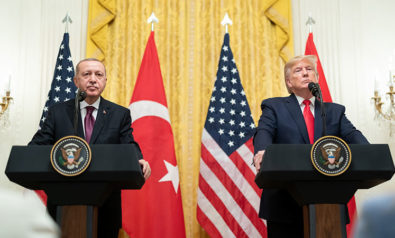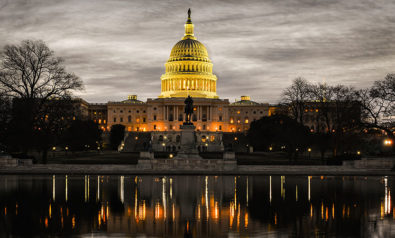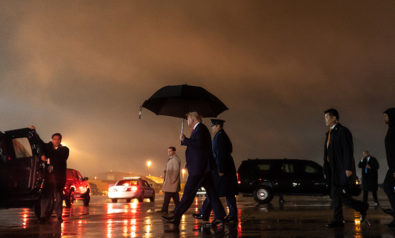Thirteen years ago, in summer 2007, I wrote a memo for the future president of the United States. The one who would take office in 2020.
At the time, I had no idea who would win the 2008 presidential election, much less an election in the distant future. In summer 2007, Hillary Clinton was the Democratic frontrunner, ahead of second-place Barack Obama by as much as double digits. Rudy Giuliani was on top of the polls for the Republican Party, with John McCain trailing behind him. I figured, wrongly, that it would stay that way.
Does Joe Biden’s Transition to the Center Have Any Meaning Today?
One year later, in summer 2008, both Obama and McCain would come from behind to secure their parties’ nomination. And I would predict in a TomDispatch piece that Obama would win the election, serve two terms and leave the US in a perilous place in 2016 because of his policies of “muddling through.” Well, I got that part right.
But in summer 2007, all I could focus on was the relative decline of the United States, as seen with “2020 hindsight.” The subprime mortgage crisis was unspooling that summer, the Bush administration was still sending more US troops to Iraq as part of its “surge” and the Chinese economy was growing by 14.2%.
Casting my mind 13 years into the future, I tried to imagine which of these three factors — Iraq, financial crisis, China — would prove most salient in explaining the downward trajectory of US standing in the world.
Here’s what I wrote back in 2007.
Memo to the President 2020
“As a member of the transition team, I’ve been asked to give a backgrounder on the ‘loss of global influence’ issue that played such a major role in the last election. I’ve submitted my study entitled End of Empire and I would encourage you to read my full analysis. I’ve been told that you might not have the time to read all three volumes. As a historian, I find it extraordinarily difficult to boil this question down to 750 words. But I will try.
Historians are divided into roughly three camps on the causes behind the end of the unipolar system headed by our country. The largest camp is the Iraq Syndrome group. They argue that the U.S. decision to invade Iraq in 2003 was the critical, history-changing moment. As you well know, the invasion turned into an unsuccessful 10-year occupation that sapped the U.S. economy and significantly eroded U.S. reputation in the world. More damaging, however, was the syndrome that followed the war. The unpopularity of the war made it increasingly difficult for the United States to launch military operations and virtually impossible to solicit international support. Although the Democrats tried to maintain high military budgets through 2010, they ultimately had to make significant cuts in order to salvage the economy.
The second camp is generally called the China Rising group. These historians, influenced by the world-systems work of Wallerstein, locate the end of U.S. influence in shifting geopolitical power and particularly the growing influence of China. As of February 2019, the Chinese economy is now larger than ours, though we still maintain a lead in per-capita GNP. More importantly, China’s turn toward multilateralism in the early part of this century caught us by surprise. The transformation of the Shanghai Cooperation Organization (SCO) into the premier international security mechanism, with its own peacekeeping forces and development bank, undercut both NATO and traditional U.S. bilateral alliances. When the EU became a member of the SCO in 2014, the transatlantic alliance was effectively over.
The Iraq Syndrome and the China Rising arguments are familiar and persuasive. But I do not believe that they fully explain our fall. The third camp, to which I belong, is called the Subprime group. Although we are currently considered revisionist historians, I believe that my End of Empire books definitively establish that the financial crisis that the United States experienced in 2007 was the key element in destroying our position in the world.
As you might remember, the United States experienced a significant housing bubble beginning in 2001. Americans became obsessed with buying houses, and selling houses. The banks devised a way of lending money to people who ordinarily would not have enough credit to buy a house. This was called the sub-prime loan. Without going into the details — please see Chapters 2-8 in Volume One of End of Empire — I will simply remind you of the rising number of foreclosures in the summer of 2007, the bankruptcy of lenders, the failure of hedge funds, the collapse of retail, the devaluation of the dollar, and the coordinated global bank interventions that turned out to be only a stopgap measure.
At the time, U.S. economists predicted that the housing market would recover by 2009. That didn’t happen. The subprime crisis revealed not only the underlying fragility of the domestic U.S. economy but the global economy as well. It is a common fallacy to draw parallels between household economics and the functioning of the national economy. However, in this case, I have argued that the parallel did apply. Average Americans, with their large amounts of debt, had to give up their prized possessions, that cornerstone of the American dream, the house. So, too, did the United States, with its nearly $9 trillion national debt, have to give up its global position, its “house” so to speak.
Historians in the two other camps overlook this simple and rather elegant explanation. Yes, the Iraq War was a tremendous drain on U.S. resources and thus a classic case of imperial overstretch. Yes, China played the multilateral card at just the right time and thereby built an international reputation. But it was a handful of greedy mortgage lenders that served as the catalyst. The market correction that followed the subprime crisis in fact turned out to be a much larger geopolitical correction that restored a certain balance to international affairs. Finally, with 2020 hindsight — to use this year’s most popular catch phrase — we can see that Iraq and China pale in comparison to the cold, hard bottom line. As you repeatedly said on the campaign trail, quoting one of last century’s most enduring lines, ‘It’s the economy, stupid.’”
Fact-Checking the Memo
Before evaluating my central argument, let’s see what I got right with the three factors. The occupation of Iraq was indeed unsuccessful in many respects, though it lasted officially for only eight years, not a full decade as I predicted. US troops returned in 2014 as part of the campaign against the Islamic State, and approximately 5,000 are still there today (though Trump has announced a reduction to 3,500 by November).
The debacle of the Iraq War has deeply affected US military thinking. It has made it more difficult for the United States to mobilize popular support and international backing for military campaigns. But during the Obama era, the US largely shifted from “boots on the ground” to war at a distance through airstrikes and drone warfare. The military budget, as a result of economic pressures, peaked in 2010 at $849 billion and then began to fall (just as I predicted but not as significantly as I would have liked to see).
China has steadily strengthened its global position since 2007. The US economy remains larger than the Chinese economy, as measured by nominal GDP. But if you look at GDP by purchasing power parity, China surpassed the US in 2017. Either way, of course, China is still behind the United States in GDP per capita. Whether China on balance has become economically more powerful than the US remains controversial.
What is not controversial, however, is China’s creation of a rival multilateralism. It decided to do this not through the Shanghai Cooperation Organization (SCO), as I predicted, but through a set of institutions that it could more easily control: the Asian Infrastructure Investment Bank (AIIB) and the New Development Bank it launched in 2014 and the various “One Belt, One Road” (OBOR) initiatives that it started in 2013. Many European countries, by the way, joined the AIIB, over the objections of the US. Those defections didn’t end the transatlantic relationship, but they certainly weakened it.
At the moment, the US is focused on China’s nationalism and the more assertive foreign policy of Xi Jinping. But even as it clashes with certain of its neighbors — India, Vietnam — China remains more focused on building a web of strong economic and diplomatic relationships around the world. And that makes China a more powerful rival for global influence than the flexing of its muscles in its neighborhood.
Finally, let’s take a look at the US economy. The subprime mortgage crisis of 2007 turned into a full-blown financial crisis the following year when Lehman Brothers collapsed in September 2008. Nearly 10 million Americans lost their houses to foreclosure between 2006 and 2014, and less than a third of them would buy another house. In 2008, 2.6 million Americans lost their jobs. The housing market didn’t recover by 2009. But the Obama administration stabilized the economy with a significant bailout of the banks, and the US economy would eventually recover.
But the financial crisis, in part because of the bank bailouts, also helped shift enormous resources to the wealthy. The resentment that caused, in the US and elsewhere around the world, helped generate a wave of right-wing politics that eventually deposited Donald Trump in the White House.
Trump and the Next President
In 2007, I could not have predicted the ultimate political triumph of Donald Trump. In fact, up until election night 2016, I still expected him to go down to defeat. Instead, I predicted that the backlash to Obama’s tepid, middle-of-the-road politics would hit in 2020. America B, the large part of the country that got hit hard by the financial crisis and never recovered, was itching for revenge. As I wrote in June 2016:
“As long as America B is left in the lurch by what passes for modernity, it will inevitably try to pull the entire country back to some imagined golden age of the past before all those ‘others’ hijacked the red, white, and blue. Donald Trump has hitched his presidential wagon to America B. The real nightmare, however, is likely to emerge in 2020 or thereafter, if a far more capable politician who embraces similar retrograde positions rides America B into Washington.”
Today, America faces a much more serious economic crisis. The stock market has barely taken any notice, as it heads back to its historic highs. Nor has Jeff Bezos and his fellow billionaires suffered from all the business closures and surging unemployment (indeed, Bezos has benefited tremendously from it all). America B, already weakened by President Trump’s trade war with China, is getting hit by the COVID-19 pandemic both economically and medically.
So, it turns out that my memo to the 2020 president is eerily prescient. The cratering economy is shaping up to be the downfall of Trump. Let’s assume that the Democrats win in November. If they want to save the country — and that is the goal, not restoring America to its unipolar position — they’d better not repeat the mistakes of the Obama era. The cold, hard bottom line is that stabilizing the economy is not sufficient, particularly if it means locking in the economic inequality of US society, preserving the unsustainable nature of US manufacturing and agriculture, and relying on financial services to pull the economy out of its current hole.
The next president has to deal with all the debacles of the Trump era — the failure to contain the pandemic, the miscalculated confrontations with China, the self-defeating hostility to internationalism. But the next president must also ensure that Trumpism doesn’t return in a politically more palatable form. To do that will require the kind of economic transformation that Obama didn’t have the political nerve (or the congressional backing) to enact.
To win in November, the Democrats have to remember that simple electoral catchphrase of the 1990s. To govern successfully and remain in charge in Washington, however, they’d better repeat to themselves an updated mantra: It’s the sustainable economy, stupid.
*[This article was originally published by FPIF.]
The views expressed in this article are the author’s own and do not necessarily reflect Fair Observer’s editorial policy.
Support Fair Observer
We rely on your support for our independence, diversity and quality.
For more than 10 years, Fair Observer has been free, fair and independent. No billionaire owns us, no advertisers control us. We are a reader-supported nonprofit. Unlike many other publications, we keep our content free for readers regardless of where they live or whether they can afford to pay. We have no paywalls and no ads.
In the post-truth era of fake news, echo chambers and filter bubbles, we publish a plurality of perspectives from around the world. Anyone can publish with us, but everyone goes through a rigorous editorial process. So, you get fact-checked, well-reasoned content instead of noise.
We publish 2,500+ voices from 90+ countries. We also conduct education and training programs
on subjects ranging from digital media and journalism to writing and critical thinking. This
doesn’t come cheap. Servers, editors, trainers and web developers cost
money.
Please consider supporting us on a regular basis as a recurring donor or a
sustaining member.
Will you support FO’s journalism?
We rely on your support for our independence, diversity and quality.



